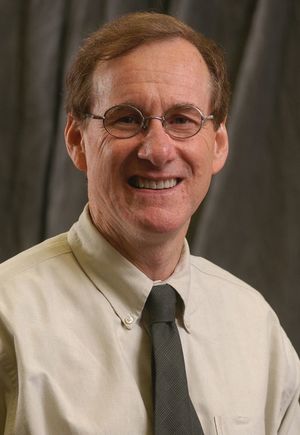 "
"
Dr. James McKenna is the endowed chair in the Department of Anthropology, as well as the director of the Mother-Baby Behavioral Sleep Lab at Notre Dame. He received his B.A. from the University of California at Berkeley, his M.A. from San Diego State University and his Ph.D. from the University of Oregon. He authored the book “Sleeping With Baby: A Parent’s Guide to Co-sleeping,” and has published over 130 articles in academic journals.
What originally inspired you to become a biological anthropologist?
I was deciding at UC Berkeley many, many years ago what breadth requirements to take. And I was talking to my friend and I said “I don’t know what to take,” and he goes, “Oh, I know exactly what you need to take, it’s introduction to physical anthropology.” And I go, “What the heck is anthropology?” Well, I went into the course kind of mystified as to what it is, and from almost the first day I was mesmerized. I just had no idea that world of knowledge, information or perspective was available. I got so interested in it, I could hardly take notes; it just grabbed me. So I took another class to make sure I liked it. I took Introduction to Archaeology, and I loved it too. And then I took another one, and went “Oh my God, I’m an anthro major.” There’s just nothing else as interesting.
In your opinion, what do you think is unique or distinctive about anthropology’s field of study?
Well, it’s eclecticism … you can hardly get bored in it. I always say that anthropology is for people that never could make up their mind about what they wanted to major in because you get biology, culture, the past, the future, linguistics, archaeology and the sense of really contributing to the reconstruction of extinct cultures. And all of this fits together in a nice, integrative way. I would say that it’s this creative integration of many seemingly different lines of evidence cross-culturally, cross-species and across the evolutionary frame.
You’ve conducted the Mother-Baby Behavioral Sleep Lab research here at Notre Dame. What relevance do your findings have to society today?
It has huge relevance, and it’s why I’m controversial in a good way, and I challenge the paradigm for mothers and babies. It all started with my wife and I going through the personal experience of getting pregnant. We ran to the bookstores, like all parents, and realized that either everything we learned in anthropology was wrong, or these recommendations about how to care for babies had nothing to do with babies, but rather with recent social ideologies about who we think babies are culturally, or want them to be: individualists, self-secure. And all these ways of recommending how to get your baby to be secure and independent were really the opposite of how you do get it, which is to give them love and tender care at the beginning of their life by sleeping with your baby.